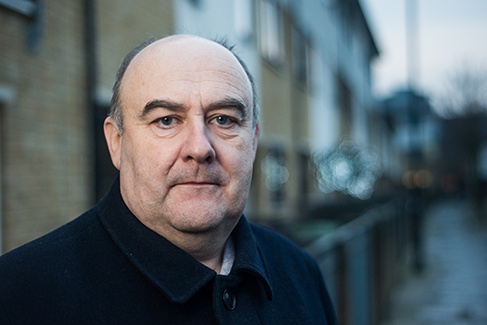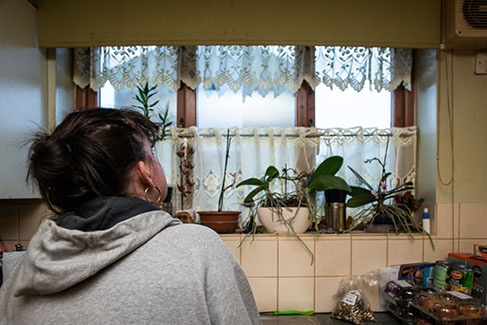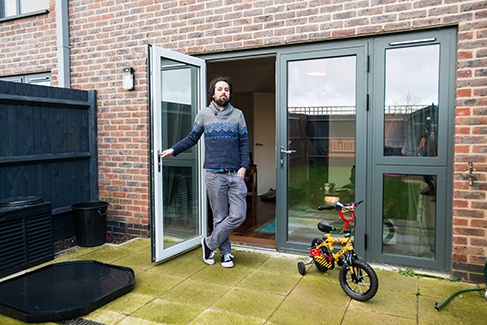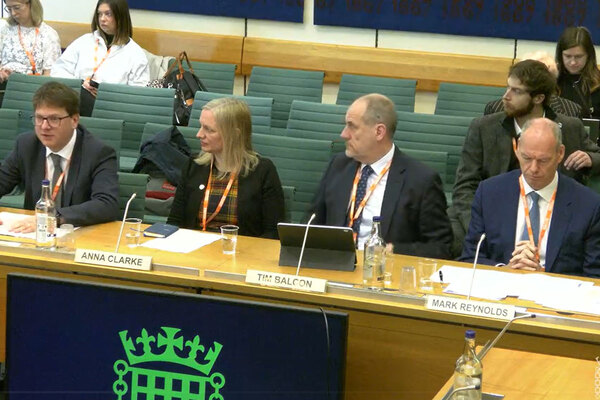Circle of despair
The inside story of Circle’s recent repairs troubles holds a cautionary tale for the sector. Pete Apps reports

It is a bitterly cold day when Inside Housing visits Joanne at her home in Bow, east London. The heating is turned well up, and this must be something of a relief. Throughout October, November and half of December, she and her family had been without heating and hot water.
“We had to have extra clothes on all the time. I bought electric blankets for the bedroom and my dad bought electric heaters for downstairs,” she says. “We’ve all been ill – coughs and colds and chest infections.”
“We’ve all been ill – coughs and colds and chest infections.”
Joanne, Old Ford resident
Joanne is not alone. In fact she is at the epicentre of one of the worst repairs crises in the sector’s history. In December, 18 months after a previous downgrade for repairs failings and just weeks after completing the biggest ever housing association merger with Affinity Sutton to form Clarion Group, Circle was placed on regulatory notice by the Homes and Communities Agency (HCA) for widespread failure in its repairs service.
This was an unexpected step for a regulator which saw its powers to police consumer affairs severely curtailed in 2011, and tells a story of unprecedented levels of concern about the failure of the service.
Inside Housing has poured over scores of documents and spoken to tenants, key stakeholders and others to build up a picture of what went wrong.
Video:
Ad slot
Large-scale trouble
What emerges is a story of failure which raises important questions about housing associations’ ability to maintain basic services as the regulator’s role in consumer affairs shift.
At the heart of the crisis are 4,000 homes in Bow. These were built through the regeneration led by housing action trusts under Tony Blair’s Labour government, passed on to Old Ford Housing Association in 2004, and then to 70,000-home Circle with the promise of further regeneration.
The problems for tenants of these homes first came to light in 2015.
This followed the appointment of Kier on a £350m repairs contract in 2013, replacing Mears, which had carried out repairs to the estates for years.
Christopher Toms, who acts as unofficial spokesperson for the residents’ group, says the repairs service had functioned reasonably well under Mears, with local engineers who knew the area and the properties.

Christopher Toms, residents’ spokesperson at Old Ford
Joanne’s issues are typical of the type of problems experienced since. But it is the scale of it which drew the ire of the regulator. A tenants’ group in Old Ford reports that on a recent walk around the estate, they saw that many of the homes had some issue with repairs, especially boilers, with residents eventually resorting to fixing the problems themselves.
The failings before April 2015 are a matter of public record thanks to an HCA judgement that year, focusing on emergency and urgent repairs and specifically calling out Old Ford as a troubled area. That judgement led to the landlord being downgraded and listed as non-compliant for governance.
Mark Rogers, then-chief executive, pointed the finger at the contract, which gave Kier responsibility for Circle’s stock throughout London. “That concept of a partnering contract that holds you into a certain route is something I don’t want to see again,” he told Inside Housing at the time.
“All [tenants] have endured serious stress and anxiety.”
Marc Francis, local councillor, Bow East
The Kier deal was terminated and responsibility for routine repairs in this area was handed on to another contractor. But Kier Gas, a subsidiary of Kier, continued to provide boiler repairs. Property consultancy Savills was also appointed at the cost of several million pounds to help implement the improvements until June 2016. The performance data coming through to the regulator was positive. A spokesperson for Kier says it was recording 99.91% compliance at this point.
But on the ground, the reality was different. In April last year, Marc Francis, a local councillor, emailed the HCA giving the names and addresses of 10 tenants, all of whom were vulnerable “either through age or disability” and who had been without heating and hot water for weeks and “in some cases months” throughout the winter. “Several of these tenants became ill as a result of the lack of heating, and all have endured serious stress and anxiety,” he wrote.
Perfect storm
Kier Gas was finally replaced by Keepmoat in the summer of 2016. But residents say problems persisted. It is understood these were a result of a perfect storm of failings. A historic failure to implement a proper replacement programme meant boilers were prone to frequent breakdowns and new parts were difficult to secure.
In addition, Circle’s records of their own boilers were outdated, which meant there were too few engineers at first, and they struggled to handle the level of demand. Gas servicing which would normally be done in summer was not carried out, leaving too much to do in the busy winter.
READ MORE ABOUT CIRCLE’S REPAIRS TROUBLES
Regulator slams giant landlord for chronic repairs failings
Circle rules out single contractor deals in London
Circle ends repairs contract with Kier
Regulator upgrades Circle’s governance rating
Regulator slams newly merged Circle for ongoing repairs failings
Leaked letter reveals repairs overhaul could run until September
John Finnerty, divisional director at Keepmoat, says it transferred across employees from the previous contractor, and has recruited more people since. He adds the contractor is “committed to delivering excellent service now and in the future”.
But the upshot of the early problems was dozens of tenants, some of them vulnerable, spending the winter shivering in unheated homes.
“Circle is engaging with the regulator to provide assurance that it is addressing identified deficiencies in the repairs service.”
Fiona MacGregor, director of regulation, Homes and Communities Agency
As Mr Francis’ emails show, the regulator was made aware – in detail – of concerns with gas servicing at Old Ford last April. Concerns around another Circle estate – Orchard Village – had also long been communicated. But parliament has placed such a high bar on the regulator’s power to act on these matters – it must be convinced there is serious detriment to tenants and has a duty to “minimise interference” – that it decided it could do nothing. A spokesperson for the regulator says decisions to intervene are “always based on the facts” and a “thorough investigation” was carried out when the issues were raised in April.
On 23 June 2016, Fiona MacGregor, director of regulation at the HCA, declined an appeal for it to get involved, saying it would not be “proportionate” to do so as “Circle is engaging with the regulator to provide assurance that it is addressing identified deficiencies in the repairs service”. She recommended that the Housing Ombudsman Service dealt with the complaints.
Six days later, Circle was upgraded to a compliant rating following its 2015 downgrade. Despite residents’ concerns, the regulator said it was satisfied Circle had “significantly improved the performance of its repairs and maintenance service”.

Amid all of this, Circle was embarking on the most ambitious merger deal in the sector’s history. Its plan to join with Affinity Sutton to create a 125,000-home behemoth to be known as Clarion Group was rubber-stamped by the HCA on 30 September, and completed in late November.
But during this period, further evidence about Circle was received by the HCA, prompting it to restart its investigation. It wasn’t until three weeks after the merger with Affinity Sutton was signed off that it finally published its notice, finding that, despite the upgrade, the association failed to meet the government’s basic standards for services to tenants.
The episode puts the spotlight on the role of the HCA. Tenants, MPs and councillors have all criticised its failure to act sooner, but the HCA maintains it acted within its brief, which is mainly to regulate governance structures and financial viability. There are many who claim, on this evidence, the bar for it to get involved in consumer affairs is set too high.
All involved now recognise the scale of the problems inherited from Circle. In a letter to the regulator, seen by Inside Housing, Clarion said it could “make significant inroads” into the backlog of complaints by April. But it warned sustained improvement would require “investment” and “new systems”.
Neil McCall, chief executive officer of the housing association business at Clarion, says Affinity Sutton became aware of the repairs issues before the merger. He says “significant progress” has been made in addressing them, with “positive feedback” from tenants, but adds that “all of these issues can’t be resolved overnight”. And they are big issues to resolve.
Litany of problems
In 2015, Colin Nickless bought a share of a three-storey modern townhouse in Orchard Village – the product of a six-year regeneration project beginning in 2004 in Rainham, a few miles east of Old Ford and the second focal point of the problems. He moved to the estate to secure a place in a nearby specialist school for his five-year-old daughter who has autism and cystic fibrosis.
Since then, Mr Nickless has experienced a litany of problems with his home. Among the most serious are leaky pipes and poor ventilation, which have caused damp so severe that his daughter has been hospitalised twice, and may have permanent health issues as a result.
The site is also being investigated for an apparent exposure to methane, which Clarion has appointed experts to investigate. A report from the fire brigade on fire safety is also being prepared, amid warnings of broken fire alarms and smoke vents, and poor fireproofing between homes. Other residents are pursuing legal action against Circle after experiencing vermin, and sewage pouring into kitchens.

Colin Nickless at his home in Rainham
Clarion recognises these issues and says it has moved to ensure residents get “a swift response… as it was clear this has not always been the case previously”. New contractors have made sure work is “either complete, in progress or booked” in most affected properties, the landlord says.
Given this swift response post-merger, how were the problems allowed to get so bad? As in Old Ford, residents point the finger at a number of culprits, including Circle’s call centre.
This call centre, known as the Orchard, is frequently named as the root of Circle’s recent strife. It was flagged by the regulator in the notice released in December and cited as a major issue in a leaked letter from former Circle and now Clarion chair, Sir Robin Young.
“All of these issues can’t be resolved overnight.”
Neil McCall, chief executive officer – housing association business, Clarion
Circle had long decided to merge its nine regional teams into one call centre. Leaked minutes from a customer engagement panel in March reveal its own customer excellence manager warned the new arrangement, with a staff of just 20, may “not help” in dealing with high volumes of complaints. Clarion says call waiting times have reduced since the merger, with 68% now answered within 30 seconds, but this was not always the case.
When Mr Toms of Old Ford tried to get in touch to report an urgent repair to his elderly mother’s supported housing accommodation (a previously botched job had left the heating stuck on full blast) he was left on hold all day. When he did get through, he recalls the call centre operative not knowing who the relevant contractor was. Similar experiences are reported by many other tenants.
Issues such as this – and the failure to respond to clear problems in Old Ford, Orchard Village and elsewhere – paint a picture of a landlord losing touch with its services on the ground. In the year before the merger, Circle was collapsing its local board structure, reducing operating costs and making changes in response to HCA concerns.
While this may have better insulated against the fear of financial failure that troubles executives and regulators, Circle is a harsh reminder of the damage that can be inflicted if a landlord fails in its most basic duty: to keep its tenants safe and warm.
Putting things right
Neil McCall, housing association chief executive at Clarion Housing Group, explains in more detail what the group is doing to rectify the situation
“Having been responsible for resident services at Affinity Sutton for many years, I have always been proud of the high standards we upheld and the quality service we provided for residents.
While it remains a challenge across the sector to get it right every single time, our high customer satisfaction rates showed that residents generally received the levels of service they expected from us.
However, we all know that things do go wrong.
As the issues facing Circle Housing in parts of London first came to light in 2015, it was clear that not all of their residents were getting the service they should.
We became ever more aware of these issues prior to the merger that created Clarion, but took the view that carrying on with the merger offered the best way to tackle them for the benefit of residents.
We were right.
While fundamental change takes time, in the two short months since we formed Clarion we have taken immediate action to improve resident services.
Call waiting times in the customer contact centre have significantly reduced and a customer care training programme is in place alongside many other changes, notably to the repairs service.
There is long way to go but I’m confident we have the right balance of determination, skills and experience at Clarion to solve these problems and our programme of action and change will result in residents experiencing further improvements.
We have also taken on the challenge of solving the defects at the Orchard Village estate in Rainham. This is a sorry tale but again, we are rising to this challenge.
Our dedicated project team has done more in the past two months than was achieved in the past two years.
All but two of the most defective properties have been visited by our new contractor and works have been completed wherever possible.
Independent consultants are conducting a full survey of the estate to understand the extent of the issues so we can ensure that these are addressed and residents get the quality homes they were promised.
While this can’t happen overnight, the positive feedback we’ve had from residents and councillors shows we are heading in the right direction – for the first time they recognise that swift, decisive action is being taken.
At Clarion our top priority will always be our residents.
Those living in Orchard Village have been let down and we have taken on the responsibility of putting things right.
The whole development was intended to meet the highest standards – building regulations approval and National House Building Council warranty cover were all obtained and signed off. So we are asking serious questions of everyone involved to fully understand where this all went wrong.
Most worryingly of all, building defects like these aren’t uncommon. There will always be some minor snagging defects to address in any new scheme but there is an increasing trend of more serious defects in new build developments.
With the government’s focus on building more homes, and Clarion’s ambition to build 50,000 new homes in the next decade, it’s more important than ever to learn lessons from the past to protect our residents, Clarion, and the investment we and government are committing.
Repairing defects after residents have moved in is the worst possible scenario for everyone.
The disruption, cost and time involved are significant – staffing levels, compensation payments and legal advice to name a few – as well as the reputational damage it can cause. Like all customer service businesses, our greatest advocates are our customers.
The wider question for the sector as it rises to meet the challenge of increasing supply is how do we ensure that our contractors deliver for us? We’ve taken on their responsibilities for too long and it’s time for us, and the sector as a whole, to hold them accountable for their performance.”











